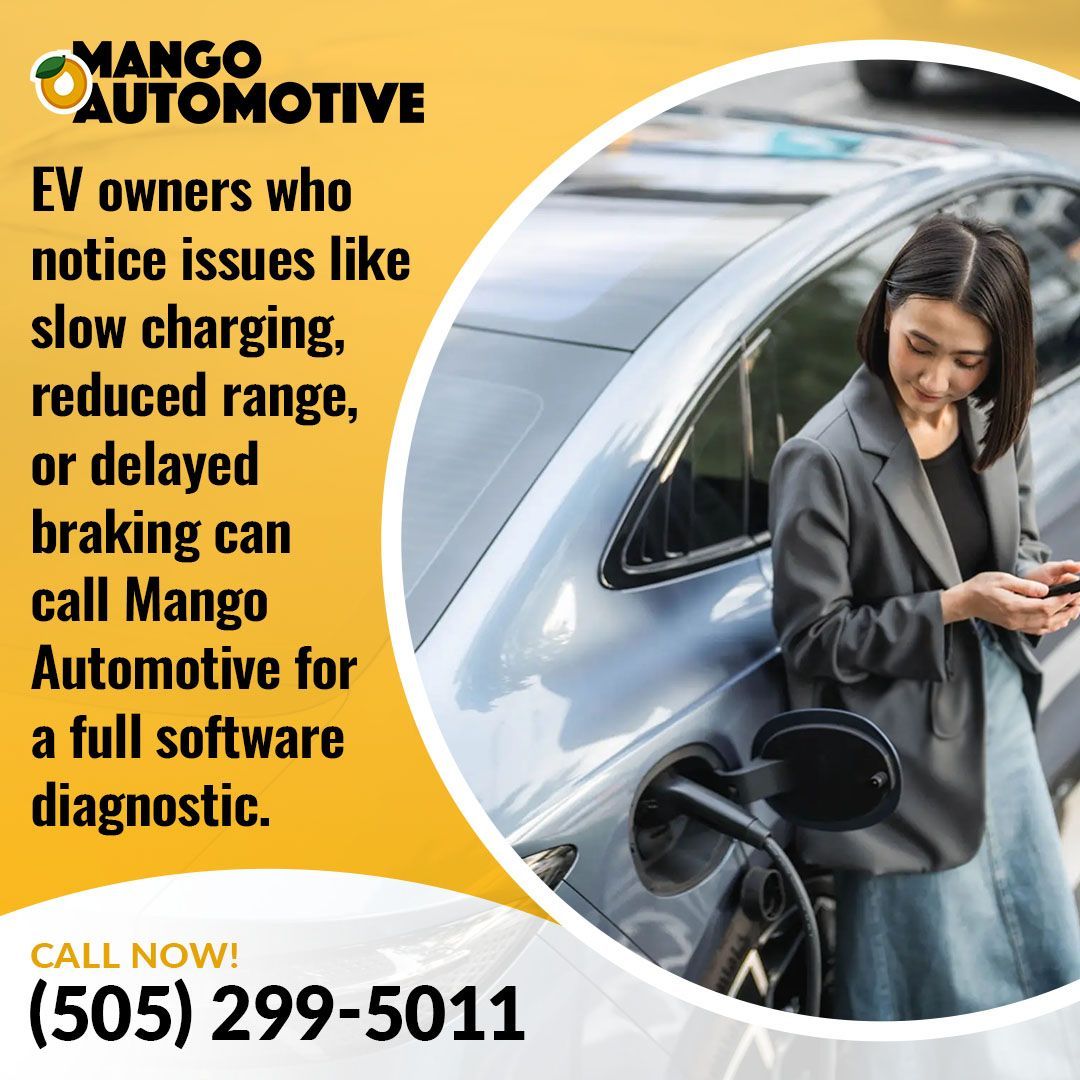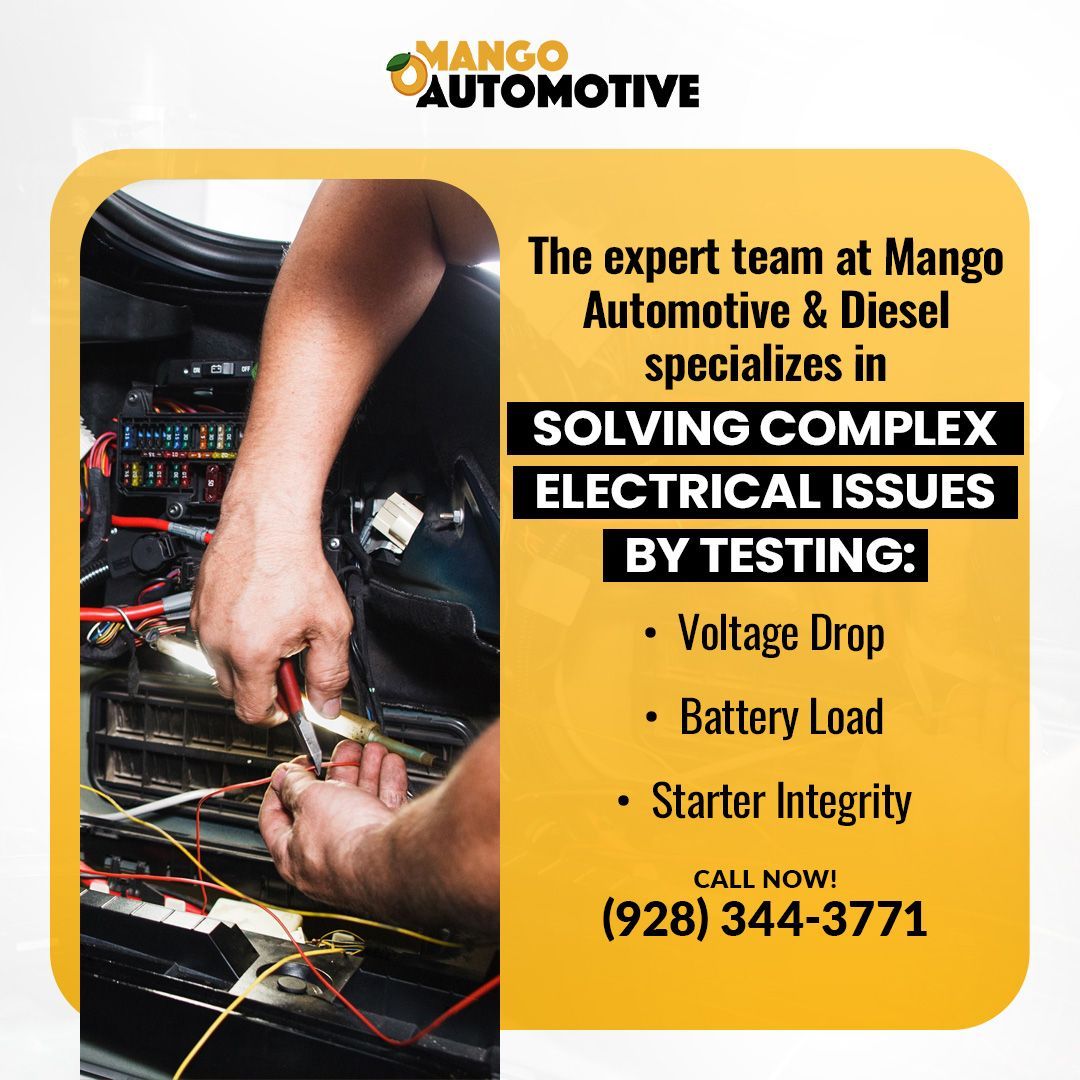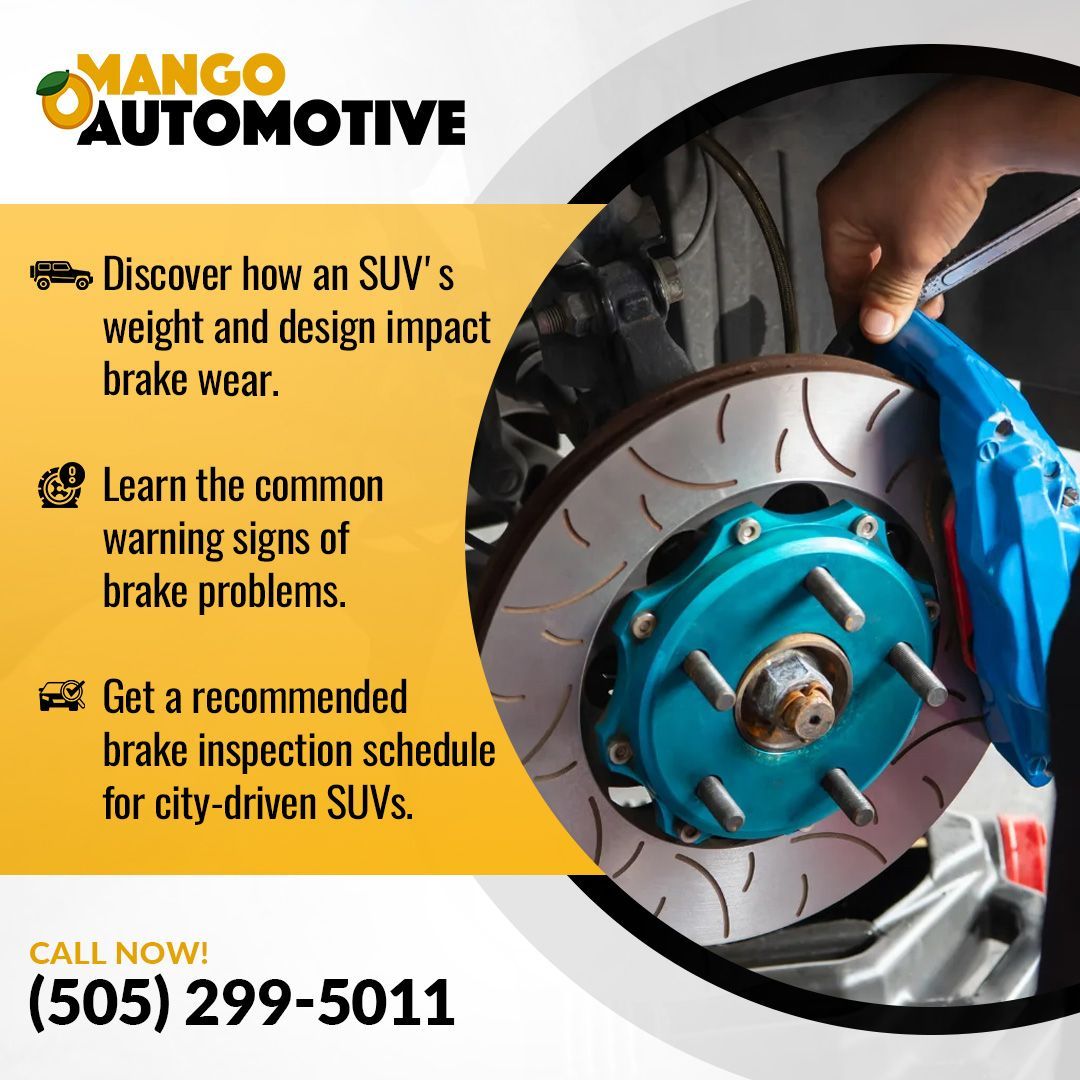EV Performance and Software Updates: What Mechanics in Albuquerque Want You to Know
Electric vehicle (EV) owners in Albuquerque are starting to encounter a new type of maintenance issue: performance problems that don’t involve mechanical wear but software configuration. While EVs typically require fewer mechanical repairs than traditional gas-powered vehicles, they rely heavily on software to manage everything from battery health to driving behavior. When this software becomes outdated or misaligned, drivers may notice reduced range, longer charging times, or inconsistent braking and acceleration. These issues often lead to confusion or frustration, especially when the vehicle appears mechanically sound.
At
Mango Automotive, we are seeing more cases where a simple software update resolves problems that would otherwise appear complex or costly. Many EV owners are unaware that these updates are available outside of dealership networks and can be performed locally by trained
auto mechanics in Albuquerque. We offer both diagnostic expertise and the tools to apply vehicle-specific updates that align with manufacturer standards.

Why EV Software Matters
The Role of Software in Modern EVs
EV software controls key systems like battery use, motor response, and driver assistance. It determines how efficiently the car accelerates, brakes, charges, and consumes energy.
Unlike traditional vehicles that rely on mechanical parts, EVs depend on digital control units and algorithms to regulate these systems in real-time. For example, the
Battery Management System (BMS) monitors cell voltage and temperature to prevent overheating or power loss. Traction control software manages torque distribution to the wheels. Over-the-air (OTA) updates can improve regenerative braking, adjust throttle response, or add safety features like lane detection.
At Mango Automotive, our mechanics are trained in EV platforms and understand how to read, test, and update these systems using diagnostic tools. If you're looking for reliable auto mechanics in Albuquerque who specialize in EV software, we provide accurate diagnostics and updates to keep your vehicle running efficiently.
Differences Between Traditional and EV Maintenance
EVs require less mechanical work but more software support than gas-powered vehicles. In traditional cars, maintenance focuses on oil changes, transmission repairs, spark plugs, and belts. EVs don’t use internal combustion engines, so they avoid most of these issues. However, they introduce digital components that require regular diagnostics and updates.
EV-specific services include firmware updates, battery calibration, and sensor alignment. Many owners don’t realize a performance dip, like sluggish acceleration or uneven charging, can often be fixed with a software update instead of a mechanical repair.
Mechanics in Albuquerque need to offer both hardware and software services to meet modern needs. At Mango Automotive, we provide system diagnostics and firmware updates for common EV models to resolve issues quickly and accurately.
What EV Software Updates Typically Cover
Battery Management System (BMS)
Battery Management System updates help regulate charging, battery health, and thermal balance. Electric vehicles use a BMS to monitor cell voltages, prevent overcharging, and extend battery life. Software updates improve how the BMS balances individual cells and reacts to temperature changes.
Charging control is one area where updates often solve real-world issues. If a vehicle is charging too slowly or inconsistently, it may be caused by outdated firmware. Thermal regulation updates manage how heat is distributed within the battery pack. This is especially important in New Mexico’s summer climate, where extreme temperatures can impact performance. Updates can improve fan cycles, coolant control, and battery heat maps.
Driving Dynamics and Motor Control
Updates to driving dynamics software improve acceleration response and energy use. Electric motors rely on software to manage throttle response, torque application, and regenerative braking. When this software is outdated, drivers often notice lag in acceleration or jerky transitions between speed levels.
Acceleration behavior can be improved with firmware updates that fine-tune the response curve. For example, Tesla has released software updates for certain models, such as the Model 3 Performance, that reduce 0–60 mph acceleration times by up to 0.5 seconds.
Energy efficiency also depends on motor control logic. Algorithms calculate how power is distributed between the battery and the motors. Updates can extend range by 5–10%, depending on the vehicle. Albuquerque drivers commuting long distances benefit from these improvements without needing a new battery.
A local auto mechanic near you who is trained in EV systems can verify whether your vehicle has the most current drive software.
Infotainment and Navigation Systems
Infotainment updates improve screen responsiveness, system stability, and GPS accuracy. Many EV owners first notice sluggish touchscreens, delayed audio pairing, or lost navigation signals. These are not hardware failures but software issues that are usually fixed with the next system update.
Screen responsiveness often drops over time as memory caches fill up or apps conflict. An update typically clears the issue. Connectivity issues, including Bluetooth drops or slow Wi-Fi handshakes, are also addressed through regular software updates. These updates are important for customers relying on mobile apps to monitor charge status or start climate controls remotely.
Driver Assistance and Safety Features
Updates improve the accuracy of collision warnings, lane guidance, and sensor calibration. Modern EVs use cameras, radar, and ultrasonic sensors to help drivers stay safe. But these systems must be calibrated precisely and kept updated to perform correctly.
Camera and sensor calibration is often adjusted through software. After a windshield replacement or a minor impact, cameras may shift slightly. Without a firmware update or recalibration, warning systems may activate late or not at all. Collision warning and lane guidance updates refine how close an object must be before a warning is issued. Updates can also add new functions.
Our team of mechanics in Albuquerque uses factory-grade tools to apply safety updates and calibrate systems to manufacturer specs. This is important not only for accuracy but also for insurance and inspection compliance in New Mexico.
Over-the-Air (OTA) vs. Shop-Based Updates
Which Systems Can Be Updated at Home
Many infotainment, navigation, and some battery system updates can be completed over-the-air (OTA). OTA updates are downloaded via a vehicle’s built-in Wi-Fi or cellular connection. These typically include fixes for audio systems, screen responsiveness, navigation maps, and minor BMS recalibrations. These updates require no interventions by mechanics and usually install while the car is parked.
That said, OTA capabilities vary by brand. Some manufacturers, like Ford and Hyundai, limit OTA to only certain features and still require shop visits for major safety-related updates.
When a Mechanic is Needed for Updates
Shop-based updates are required for safety systems, motor controls, sensor calibration, and firmware-level changes. OTA systems can’t access all vehicle modules. For example, updates to collision detection, camera calibration, and torque mapping require tools that interface directly with the car’s onboard diagnostics (OBD) port.
These adjustments are not handled remotely and must be installed by a qualified auto mechanic near you. Also, if an OTA update fails or stalls, a manual reset using diagnostic equipment may be necessary. This is something that can only be performed by trained professionals at a qualified repair shop.
How Mango Automotive Performs EV Software Updates in Albuquerque
Mango Automotive uses factory-approved diagnostic platforms to install, validate, and test EV software updates. We begin with a full scan of the vehicle’s software version history. Our mechanics check compatibility, perform required backups, and verify if manufacturer updates are pending. The process includes post-update testing to confirm that features like lane assist, charging control, and infotainment are working as intended.
Our shop is equipped to service EVs of different makes and models. For those searching for a qualified
auto mechanic near you for updates beyond the reach of OTA, Mango Automotive provides local support with certified expertise.
When an EV Might Need a Software Check
Symptoms That Point to Software Problems
Dashboard Warning Lights
Unexpected warning lights can indicate software faults in critical vehicle systems. If an EV’s screen displays alerts for the battery, brakes, or driver assistance, even when hardware appears fine, the issue may lie in corrupted or outdated software. These warnings often appear after incomplete OTA updates or system conflicts.
Charging Irregularities
Inconsistent charging speed or failure to charge fully can stem from software miscommunication with the charging system. This can be due to errors in the Battery Management System (BMS), firmware bugs in the charge controller, or incorrect vehicle-to-charger handshakes. Some EVs may abruptly stop charging before reaching target levels or show fluctuating rates on home and DC fast chargers.
Our
mechanics in Albuquerque can diagnose these faults using manufacturer tools to test real-time voltage, current flow, and system logs.
Sudden Drops in Range
Software faults can cause range estimates to decrease suddenly, even if the battery is in good condition. If an EV's range drops without physical signs of degradation, the issue could be a miscalibrated energy management system. This includes problems in algorithms that predict consumption based on terrain, speed, or battery temperature.
In these cases, our mechanics perform range prediction resets and apply model-specific updates to restore accuracy.
How Our Auto Mechanics in Albuquerque Identify the Issue
Mango Automotive uses certified diagnostic software and live data analysis to isolate software faults in EVs. Each vehicle undergoes a structured evaluation that includes system scans, voltage checks, firmware version tracking, and sensor alignment. We compare stored system logs against manufacturer specs to identify inconsistencies.
By narrowing down whether the issue is software, hardware, or both, our auto mechanics in Albuquerque save customers time and avoid unnecessary part replacements.
Why EV Owners in Albuquerque Trust Mango Automotive
Knowledge of Vehicle-Specific Software Platforms
Mango Automotive technicians are trained to work with brand-specific EV software across multiple makes and models. Each EV brand uses its own software architecture. Our mechanics in Albuquerque are trained in how these platforms interact with hardware components such as the inverter, motor, and onboard charger.
When an update affects regenerative braking or alters charge timing, our mechanics know how to apply brand-approved procedures. This reduces the risk of misapplied patches or compatibility errors.
Advanced Diagnostic Tools and Trained Technicians
We use dealership-grade equipment and licensed tools to access and update EV software systems. These include OBD-II readers configured for EV-specific modules, OEM diagnostic platforms, and battery state-of-health software. This allows Mango Automotive to check firmware versions, recalibrate sensors, and run system diagnostics without relying solely on manufacturer service centers.
For example, if a customer reports inconsistent power delivery, we use live data streams to examine the drivetrain control module and determine whether a software update is overdue.
All technicians receive ongoing training on EV systems, including battery safety, CAN (Controller Area Network) bus communication that lets various electronic components in a vehicle talk to each other without needing a central computer, and update sequencing.
Customer-Focused Approach to Repair and Service
Our team focuses on transparent service, clear explanations, and solutions tailored to how customers use their vehicles. EV owners in Albuquerque often use their vehicles for long commutes, high-desert travel, or weekend charging at home. We take these factors into account when diagnosing software problems or recommending updates.
Customers are always informed about what is being updated, how long it will take, and what changes to expect. Our shop prioritizes reliable repairs and customer satisfaction, whether the issue is charging delays or outdated navigation data. This has made Mango Automotive a trusted choice for EV drivers looking for a mechanic in Albuquerque who understands the unique demands of electric vehicles.

Schedule an EV Software Update Check in Albuquerque
Regular software updates help electric vehicles perform as intended and extend the life of key components. From battery management to safety systems, each update improves how your EV handles real-world driving. Ignoring these updates can lead to problems like charging delays, range loss, or inconsistent acceleration. Mango Automotive offers full software diagnostic and update services at our Albuquerque location. Our trained technicians use licensed tools and procedures to get the job done right.
Keep your EV performing at its best—book a software update check with Mango Automotive today. Call
(505) 299-5011 to schedule your appointment with the trusted auto mechanic near you.














